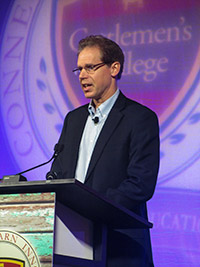Sustainability and the Future of Beef
Beef's largest marketer asks producers to join in defining what sustainability means for the beef industry.
by Kindra Gordon for Angus Journal®

“This is not a do-gooder effort. This is a journey for good — together,” said McDonald's Vice President Bob Langert of the company's most recent initiative focused on beef. “We feel with sustainability we can grow our business and, in turn, grow your business.”
NASHVILLE, Tenn. (Feb. 4, 2013) — McDonald's statistics are impressive. It has 34,000 restaurants and just reached the milestone of serving 70 million customers a day. The famous golden arches can be found in 119 countries — and in mid-February 2014 that will bump up to 120 with the addition of a restaurant in Vietnam. The company employs 1.8 million people, and it is the world’s largest marketer of beef, purchasing 2% of the beef produced in the United States and around the world.
Of the company’s more than 50-year uber-successful history, Bob Langert told Cattlemen’s College® attendees on Feb. 4 in Nashville, Tenn., “If we didn’t change, we’d be a withering and dying business. … The customer is our primary business driver for McDonald’s.”
Langert has been with the food giant for 31 years and today serves the company as vice president of corporate social responsibility and sustainability.
He told the more than 6,000 in attendance at the opening general session that what McDonald’s and the beef industry have in common is a “commitment to selling beef — great-tasting beef.”
That said, Langert noted that customers have — and are — dramatically changing their food demands. One way McDonald’s is addressing this is its announcement a month ago that it plans to start purchasing verified sustainable beef by 2016. They already purchase certified sustainable fish and coffee.
“This is not a do-gooder effort. This is a journey for good — together,” Langert said of this most recent initiative focused on beef. “We feel with sustainability we can grow our business and, in turn, grow your business.”
He admitted that the company does not currently have a detailed, defined plan of what sustainability means for the beef industry. He emphasized that they recognize a sustainable supply chain includes the three Es — ethical, environmental and economical.
He encouraged the industry to be a partner — and leader — in helping create a sustainability definition and plan for the future.
“Let’s take charge in defining what is sustainable beef — and not let activists do it,” he emphasized.
Langert mentioned the Global Roundtable for Sustainable Beef as one group they will look to heavily as they prepare to implement their new initiative for 2016.
As that future approaches, he emphasized, “Our pledge is to continue to collaborate, not mandate.”
To the producers in attendance, he said, “You might be sustainable, but you have to prove it and have evidence points. Telling stories and saying, 'trust us,' isn’t enough. It’s about doing more.”
He concluded by noting that sustainability “is part of business” and said, “Let’s create this future together.”
Editor’s Note: The above article was written under contract or by staff of the Angus Journal. It may not be reprinted without express
permission of the Angus Journal. To request reprint permission, contact the editor at 816-383-5200.
www.4cattlemen.com is an event coverage site provided by the Angus Journal editorial team, which publishes the Angus Journal, the Angus Beef Bulletin, the Angus Beef Bulletin EXTRA and the Angus Journal Daily. For questions about this site, to submit an article for our consideration, or to report a broken link, contact the editor at 816-383-5200; 3201 Frederick Ave., Saint Joseph, MO 64506.
The Angus Journal claims copyright
to this website as presented. We welcome educational venues and
cattlemen to link to this site as a service to their audience.

